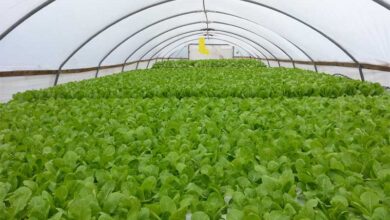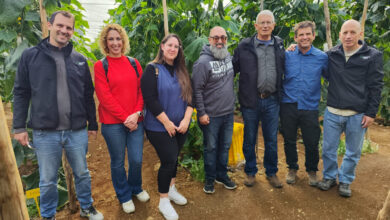Why Israel’s Investment in Advanced Agriculture is Essential for Our Future

Motti Levin, CEO of Haifa Group
In a world increasingly affected by climate change, geopolitical instability, and economic challenges, food security has become a critical issue. Global food production must rise by 60% by 2050 to meet the needs of a growing population, despite shrinking arable land and water resources. For Israel, food security is not just about supply but national security. Reliance on imports exposes us to global supply chain disruptions, making investment in advanced agriculture crucial to ensuring a stable, self-sufficient food supply.
Israel has a history of overcoming significant challenges—from wars at our borders in the 60’s to harsh climatic conditions—through innovation. Our agricultural achievements during these critical times established us on the global map. Today, we must draw on our past successes to reassert our leadership in advanced agriculture, enhancing food security at home and offering solutions to the world.

The recent appointment of a Minister of Food Security underscores Israel’s recognition of the importance of this issue. While much remains to be done, this is a significant step forward. We possess the knowledge and innovative capacity to strengthen our position, but reinvestment in our world-class research institutions is essential. These institutions, which played a pivotal role in past successes, now face declining funding and brain drain. Reversing this trend and investing in the next generation of agricultural minds is imperative for our future.
Food security is also closely tied to strengthening Israel’s borders. Encouraging a new generation to engage in agriculture—not just out of Zionism but because it is economically viable and technologically advanced—is essential. Establishing research institutes or advanced agricultural farms in border areas, like the one Haifa Group plans in the Gaza Envelope, is a strategic move. Investing in education to cultivate future farmers is equally vital for our national resilience.
Technology is central to this strategy. Supporting AgTech startups and providing subsidies to farmers will enable them to continue their important work. Prioritizing locally produced agricultural goods over imports is critical, especially in a country as small and arid as ours. Sustainable agricultural practices are essential, and we have already demonstrated expertise in areas such as drip irrigation, smart fertilizers, and recycling irrigation water. The state must continue to encourage the integration of technology into agriculture, ensuring it remains both economical and sustainable.
Advanced agriculture, which emphasizes efficiency and sustainability, is at the heart of this effort. By minimizing waste and maximizing resource efficiency, we can reduce our dependence on external resources and mitigate environmental impacts. For instance, organic waste can be converted into biofertilizers, and water used in agriculture can be recycled and reused, as Israel has successfully demonstrated through its pioneering work in reclaiming wastewater for irrigation.
AgTech innovations play a pivotal role in advancing agriculture. Precision farming technologies allow for the efficient use of inputs like water, fertilizers, and energy, reducing waste and environmental impact. Haifa Group’s precision agriculture solutions, for example, help farmers tailor fertilizer application to the specific needs of their crops, minimizing overuse and runoff. This approach not only protects the environment but also enhances the sustainability of agricultural practices.

Moreover, AgTech provides the tools to address Israel’s unique food security challenges. Technologies such as precision agriculture, drip irrigation, and AI-driven farm management systems allow for more efficient use of resources, ensuring that crops receive exactly what they need. Israel’s success in reusing nearly 90% of its wastewater for agriculture is a testament to the power of innovation in overcoming resource constraints.
Maintaining Israel’s global leadership in advanced agriculture requires continued investment in research, development, and the implementation of cutting-edge technologies. By leveraging our strengths in both agriculture and technology, Israel can solidify its position as a global agricultural powerhouse. This leadership extends beyond economic gains—by developing and sharing agricultural innovations, Israel can contribute to global food security, particularly in regions facing similar challenges. In doing so, we enhance Israel’s global standing and strengthen our economy.
One of the most promising aspects of AgTech is its ability to make farming both more profitable and sustainable. Precision agriculture enables farmers to optimize their use of inputs, leading to significant cost savings. Additionally, by improving efficiency, precision agriculture increases profitability, making agriculture a more attractive and viable livelihood.
Investing in advanced agriculture is especially crucial for regions like the Gaza Envelope, where agriculture is a vital part of the economy. Precision irrigation and smart farming systems can boost productivity, reduce costs, and enhance resilience, ensuring the region remains competitive and a key contributor to Israel’s food security. For example, nearly 60% of Israel’s tomatoes come from this area, highlighting the importance of strengthening both the region and its agriculture to bolster national food security.
In summary, Israel’s investment in advanced agriculture is a strategic imperative. By fostering innovation, supporting key agricultural regions, and strengthening Israel’s global leadership in agricultural technology, we can secure a brighter and more sustainable future.




